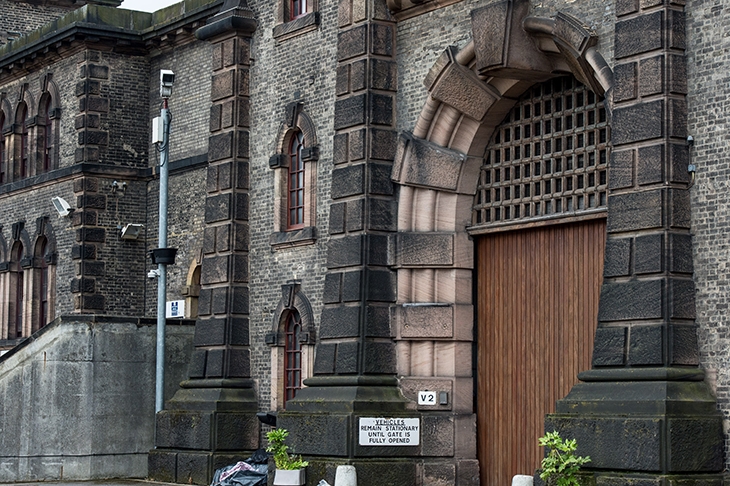About the time Chris Atkins’s cell was slammed shut at Wandsworth Prison for the first time, I was sitting on the 10th floor of the UK Ministry of Justice, glued to BBC News. My boss, Michael Gove, had just been given the boot by Theresa May, and as his speechwriter I would be inherited by whoever replaced him as justice secretary.
Without warning, No. 10’s black door swung open to reveal a delighted looking Liz Truss — the new chief executive of a creaking government department with 75,000 employees (including all prison and probation staff), with responsibility for a prison system that was in meltdown. I remember madly googling what she might think about prisons, only to be reminded that she was coming straight from the environment department. The archive was chock-full of pig disease and bees.
On the other side of Wandsworth’s high prison walls, Atkins remembers a feeling of being somehow ‘mystically linked’ to Truss, ‘as we both embarked on our unlikely prison journey at the same time’. While I bashed out her high-minded first public statements — about wanting prisons to be ‘places of safety and reform’ — he was experiencing the far grittier reality.
A middle-class lefty, Bafta nominee and witness at the Leveson inquiry into the ethics of the press, Atkins had scammed the taxman while making a film about tabloid newspaper culture. His accountant made some clever ‘modifications’ to a scheme that helped with the funding. So he finds himself sharing a 6 x 12ft cell with a Nigel Farage-supporting cocaine smuggler called Ted.
He learns that Wandsworth, once a cutting-edge institution built in 1851 under the influence of Jeremy Bentham’s panopticon design — to give prisoners the feeling of being watched non-stop from a central hub — is now filthy, dangerous, chaotic and overflowing with mental illness. ‘Porridge infrastructure with One Flew Over the Cuckoo’s Nest personnel,’ as he puts it. Hardly a place to turn convicted criminals into law-abiding citizens.
The result, however, is a razor-sharp and darkly funny memoir that should be mandatory reading for justice ministers, ministry officials, Her Majesty’s inspectors, and anyone at all interested in the anarchy that is the UK prisons system. Behind bars, Atkins seems to have kept his sanity by turning an imaginary camera on himself.
He describes the quantity and potency of the available drugs. Spice is ubiquitous, including a virulent strain called ‘Man Down’. About half the prisoners are on spice, and it shows: they look like ‘extras on a zombie film, with saucer white eyes, flaky skin and a twitchy step’. Atkins thinks he was one of the few inmates who didn’t own an iPhone, also used to transfer funds in the prison drugs trade. Another phone model — the Beat the Boss — was the size of a thumb and had no metal parts. It could be hidden up inmates’ backsides and evaded the sit-down metal detector known as ‘the Boss’.
Prison is not the Oxford-educated filmmaker’s natural habitat. But there are some funny and touching moments. He quickly discovers his tribe — the White Collar Club, including a former Deutsche Bank managing director, who live in a group of nicer-than-average cells they christen ‘Little Hampstead’. One advises him on how to get away with nicking prison supplies. ‘The secret to survival is bulk theft. If you’re caught swiping a bag of oats, you’re fucked. But if you pick up a whole box, the screws will hold the gate open.’
Another explains ‘shittiquette’, or how to use the cell’s toilet when there’s only a screen for privacy (turn up The Victoria Derbyshire Show as loud as it will go). The humor keeps him sane, but he struggles being apart from his young son, Kit. When he receives his first family visit, ‘It’s like I’ve been watching an incomprehensible film in Russian and someone has briefly turned on the subtitles.’
Early on, Atkins realizes that the best prison officers are military veterans. They seem ‘terrifying’ to begin with, but turn out to be the friendliest and most capable of the staff, usually with 10 years’ experience and a canny ability to spot and stamp out trouble. But because of reforms and cuts brought in by Chris Grayling (the justice secretary before Gove), he finds they are leaving en masse and being replaced by ‘younglings’. These newbies ‘tiptoed round the wing looking like they bitterly regretted switching jobs from PC World’. At the first sign of any trouble, they lock everyone in the cells, often for 22 hours a day or more.
Remember this when you next hear the Ministry of Justice boasting that it has hired 4,000 or so prison officers since 2016 (when the prisons estate hit rock bottom). As a senior official admitted to me privately, a single good screw — one who had spent many years learning ‘jailcraft’ — could be worth four or more inexperienced young hires. One elderly officer tells Atkins that in three months he’s said goodbye to colleagues with a combined total of 700 years’ service. No wonder there is so little education or rehabilitation going on; and that reoffending rates remain so stubbornly high.
Self-improvement is tricky, one imagines, with the kind of cellmates Atkins is forced to put up with. In his efforts to be upgraded to a wing with more privileges, he ends up ‘trapped in a temple of porn’ with a sinister Romanian. In this cell, every square inch of the walls and ceiling — plus the inside of the cupboards, the window frames and the underside of the bunk bed — is ‘coated’ with magazine pornography. He soon falls out with his cellmate, who proceeds to intimidate him by means of passive-aggressive masturbation. This must happen a lot. Around the same time, my Ministry of Justice colleagues were hushing up a rumor about Max Clifford being caught doing the same thing in a prison’s visitor center.
Having followed Liz Truss’s announcements closely, thanks to letters from friends, he hears the ‘deeply thrilling news’ that she is to visit the prison herself. Wandsworth’s Governor, Ian Bickers — the golden boy of prison reform at the time, shoehorned into many a ministerial speech — wants to show off his ‘purple army’. This is a motley group of prisoners who are given purple shirts and basic admin roles to allow prison officers more time to unlock inmates. They are prison prefects, in effect.
To his credit, Atkins stops short of outright cynicism here. He thinks the purple army is a good idea. When it fails miserably, he perceptively notes the role of the Prison Officers Association in sabotaging it. The trade union, it emerges, is fiercely resistant to prisoners taking work from officers, as it will threaten their jobs. It’s a ‘remarkably blinkered’ position, he says, ‘as officers don’t have time to do low-level admin work anyway, which is why Wandsworth is such a dysfunctional mess’. He suddenly feels sorry for Governor Bickers, who is ‘attempting some radical reforms, but is being blocked by a union stuck in the 1970s’.
The saddest consequence of this mess can be found in the case of Osvaldas Pagirys, a Lithuanian boy who was 18 when he was arrested for the pathetic crime of stealing sweets. At Wandsworth, he was found with a noose around his neck on five separate occasions. His suicidal tendency was treated as bad behavior and he was sent to the punishment block. Then, one evening, after his cell’s emergency alarm was pressed, officers arrived — after a 37-minute delay — to find him hanging, unconscious. He died soon afterwards. Atkins encounters plenty of other disturbed teenagers in his role as a volunteer ‘listener’, noting that most of them needed medical help, not 22 hours a day in a squalid concrete box.
Does prison work? In a very narrow sense, just about. Despite what some campaigners claim, there is probably a link between the generally lower levels of crime today and the fact that the UK prison population has risen by 69 percent over the past 30 years. One gathers, in this case, that Atkins will not be scamming the taxman again anytime soon. Yet it is hard to avoid two conclusions when reading his lurid account of prison life. That, if a society is judged by how it treats criminals, we can hardly call ourselves civilized — and that the organization which manages this national scandal, the Ministry of Justice, isn’t up to the job.
This article was originally published in The Spectator’s UK magazine. Subscribe to the US edition here.


























